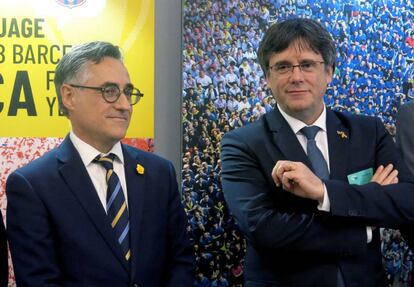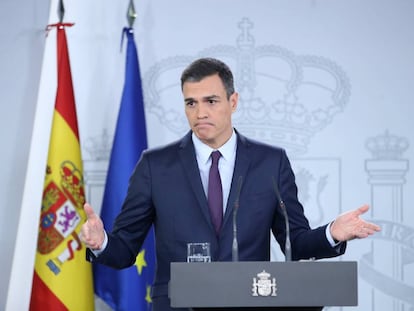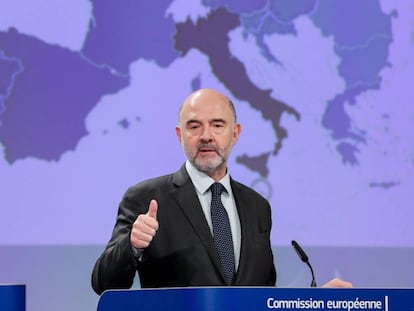Ex-Catalan premier Carles Puigdemont to run in European parliament election
The politician, who is living in Belgium after having fled Spain, would be arrested if he were to come back to the country to be sworn into the role

Carles Puigdemont, the former Catalan premier who fled Spain to avoid arrest after the unilateral independence declaration of October 2017, will run as a candidate in the May 26 European parliament elections.
Puigdemont, who now lives in Belgium, will be the candidate for Together For Catalonia (Junts per Catalunya), a political platform that includes members of his own Catalan European Democratic Party (PdeCAT) and independents.
It is unclear whether Puigdemont can serve as an MEP, as he would have to be sworn in to the role Spain, where he would be arrested on charges of rebellion and misuse of public funds. But members of his platform view the move as a good way to “internationalize the process,” in reference to the ongoing secessionist drive.
Meanwhile, the former premier has also imposed his views over the more pragmatic sector of the party with a view to the Spanish general election that has been called for April 28. On Sunday, PdeCAT’s national council approved the candidacies of several politicians and civil society leaders who are currently standing trial in Madrid over their role in the secession attempt of late 2017.
Jordi Sànchez, the former head of a pro-independence association called ANC, will run for the province of Barcelona; former Catalan government spokesman Jordi Turull for Lleida, former territorial affairs chief Josep Rull for Tarragona, and Puigdemont’s lawyer, Jaume Alonso-Cuevillas, for Girona.
Joaquim Forn, the former Catalan interior chief, will run for mayor of Barcelona in the municipal elections, which, like the European parliament elections, will also take place on May 26.
The Catalan separatist deputies who are elected will likely follow a hard line aimed at securing support for the right to self-determination
Most of these individuals are being tried for rebellion, sedition and misuse of public funds in connection with the secession attempt, which led the central government in Madrid to use constitutional powers to sack the entire Catalan government and suspend self-rule for seven months using Article 155 of the Constitution. The majority are in prison awaiting the end of the trial and a verdict, which means that their potential seats in Congress could be left empty after the elections. And the Catalan separatist deputies who do take up a seat in Spain’s lower house of parliament will likely follow a hard line aimed at securing support for the right to self-determination.
“The debate is, what are we going to do in Madrid?” said Carles Campuzano, a PdeCAT deputy, at a party meeting last Thursday. The question is whether Catalan separatist deputies with congressional representation should attempt to engage in politics with the central government, or systematically block the working of the institutions to the point of collapse in a bid to secure Catalan independence.
An early indication of separatist parties’ inclination for this latter line of politics is their recent refusal to negotiate a budget plan that raised funding for the region. Their position forced the minority Socialist Party (PSOE) government of Prime Minister Pedro Sánchez to call a snap election for April 28.
The Catalan Republican Left
Catalan business leaders are wary about the new turn taken by PdeCAT, formerly known as the Democratic Convergence of Catalonia (CDC). Some of them now feel that the Catalan Republican Left (ERC), another separatist party, “seems more trustworthy than the old Convergence,” said one business association leader.
ERC chief Oriol Junqueras, who once served as Puigdemont’s deputy and is now on trial for rebellion, will also be running on the candidate list in the upcoming general election. And the far-left CUP, a small separatist, anti-capitalist party that has played the role of kingmaker in the Catalan parliament, is now considering running in the general election for the first time, attracted by the idea of helping block national politics.
English version by Susana Urra.
Tu suscripción se está usando en otro dispositivo
¿Quieres añadir otro usuario a tu suscripción?
Si continúas leyendo en este dispositivo, no se podrá leer en el otro.
FlechaTu suscripción se está usando en otro dispositivo y solo puedes acceder a EL PAÍS desde un dispositivo a la vez.
Si quieres compartir tu cuenta, cambia tu suscripción a la modalidad Premium, así podrás añadir otro usuario. Cada uno accederá con su propia cuenta de email, lo que os permitirá personalizar vuestra experiencia en EL PAÍS.
En el caso de no saber quién está usando tu cuenta, te recomendamos cambiar tu contraseña aquí.
Si decides continuar compartiendo tu cuenta, este mensaje se mostrará en tu dispositivo y en el de la otra persona que está usando tu cuenta de forma indefinida, afectando a tu experiencia de lectura. Puedes consultar aquí los términos y condiciones de la suscripción digital.










































